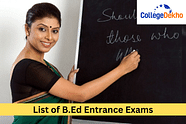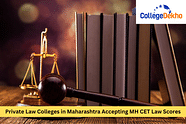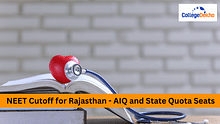Interviewers love asking tricky questions during MBA interviews. These questions often leave candidates fumbling for an answer or send them down a wrong path. Here are some of the top tricky questions asked during MBA interviews and how to answer them.

5 Tricky Questions Asked in MBA Interviews: For students aspiring for admission to an MBA course, Personal Interviews seem like an obstacle to be overcome. They are a part of the MBA admission process of almost all major B-schools. Sitting for a Personal Interview can be hectic, especially for a fresher. However, the important thing to remember is why a Personal Interview is conducted in the first place.
The aptitude and subject-related knowledge of a candidate are tested by factors such as eligibility, entrance exams, and cut-offs. MBA interviews are more about helping a college understand a candidate's personality, career goals, and approach to problem-solving. In a Personal Interview, a candidate's ability to communicate and clearly present their ideas is also tested. These are generally termed soft skills.
Since soft skills are not the best asset of many candidates, the prospects of sitting for a Personal Interview for admission to the MBA colleges in India may seem daunting. However, one must remember that proper preparation and knowledge go a long way in helping you succeed.

Also Read:Common Mistakes in MBA Interviews and How to Avoid Them
Tricky Questions Asked During MBA Interviews
Here are some of the tricky questions asked during MBA interviews, that may leave you scratching your head for the answer. They may not be a part of every interview process but being prepared for a situation where you might be asked any of these questions is always better than fumbling for an answer or falling into the interviewer's trap during the interview.
1. What is your biggest weakness?
It is not easy to admit your weakness and being asked for it by an interviewer seems like a matter of concern. Candidates are usually confused about what is the best way forward in such situations.
Reason behind the question: Here is the thing, the interviewer does not want to discourage you or shame you. Instead, what they want to see is how clear of an idea you have of your weaknesses and what is your approach to overcoming them.
Do's: It is best to humbly admit to your weakness without getting too much into details. Instead, focus on what steps you have taken to correct your weakness. When deciding on which weakness to share, steer away from extremes unless the corrective measures you have taken show strong personality and judgment. Always end your answer on a positive note.
Don'ts: Do not answer that you don't have any weaknesses or go into details about your personal life.
Example: 'I tend to focus on perfection. This sometimes leads me to pay unnecessary attention to little details, which compromises my speed and efficiency. I am taking steps to find a balance between the two.'
2. Tell me about a time when you had to deal with failure.
Again, talking about failures is uncomfortable, especially when you are facing a panel that would decide whether or not you are capable of joining a course. However, failure is something that we have all faced at some point in our lives.
Reason behind the question: An experienced interviewer is looking for an honest answer from the candidate. The question’s motive is not to focus on the fact that you failed or even the project in which you failed, it is to understand how you dealt with failure and what were your learnings from it.
Do’s: Pick an example where you failed to achieve a target or goal. Describe your thoughts on why you failed in brief. Focus more on the corrective measures you took to compensate for your failure and what you learned from the process.
Don’ts: Do not give an extreme example of failure and do not take examples from your personal or love life. Don’t put the blame on someone else or give an example where your failure may have caused big problems for others.
Being honest is important but talking about an incident that got you fired or severely reprimanded will not paint a good picture in front of the interviewer.
Example: 'I was assigned a project in college but failed to achieve the target. I got back to the drawing board, identified the reason behind the failure, consulted other sources of information, and improved my skills and knowledge about the subject.'
Fill in the answer provided above with specific details.
3. Counter questions about hobbies or careers.
An interviewer may ask you to elaborate on a topic you presented as your personal interest or ask about your previous work duties or about an important role you were given during your academics or work. These may be such questions such as 'Which is your favorite book?' or 'Which was the last book you read?' or 'Which type of music do you listen to?' or 'Share an example from your time as the Cultural Incharge of your school/college.'.
Reason behind the question: The interviewer may either be trying to go more into your interests to make you feel at ease or they may be asking you the same to gather more information for further conversation. The question may also be asked to ascertain whether the information you have shared is correct.
Do's: Always have something to back up your claim during a personal interview. Keep in mind that you are trying to portray your best side in a Personal Interview. Reserve any information that you do not have much information about.
Don'ts: Do not oversell your personal interests. Eg. If you play the guitar just for fun and relaxation, don't pose as if you are the expert on guitar and music.
4. Reason to take up an MBA or 'Why MBA after ...?'
You may be asked why you have applied for the particular college or course. Students belonging to other backgrounds such as engineering may be asked why they are opting for a management course instead of pursuing M.Tech.
Reason behind this question: This is a test of your analytical thinking skills and how clear you are on your career goals. The interviewer may be interested in knowing your future plans and how you want to benefit from your course.
Do's: Describe your career goals and how you plan to achieve them through this course. Providing specifics related to study and subjects is the best way to go. If you think you committed a mistake in choosing your last career option, admit it and talk about the ways in which you plan to go forward to get your career on the right track.
Although it must be avoided, remember that even if you an answer that may be perceived as bad (eg. simply to earn more money) how you sell it matters a lot (eg. to get closer to my career goals). It will still be better than not having any reason at all.
Don'ts: Don't give an answer that shows uncertainty or lack of goals.
5. Do you have any questions for us?
This is a very commonly-asked question at the end of a Personal Interview. While the question may seem harmless or useless at first glance, how you choose to go forward with it can leave a lasting impression on your interviewer's mind.
Reason behind the question: The interviewer may ask this as a polite way to end the interview. However, this can be used as an opportunity to clear any doubts you have.
Do's: Research well about the course and college before the interview. That may cause you to have some doubts about the course and help you pose a serious question. If you do not have a question, politely decline and thank the interviewer.
Don'ts: Do not ask for the interviewer's assessment of your interview. Avoid questions related to the functioning of the college (such as placements, hostel conditions, etc.).
It is better to have some answers prepared before the interview. Not in the sense that you write it down and learn it by heart but in the sense that you have some selected topics, achievements, failures, and anecdotes to talk about. Stressing a lot about an Interview can have a negative effect. Instead, it is much better to treat it like a conversation, be polite at all times, and put your best foot forward.
Related Articles:
MBA Admission: Preparation Tips and Tricks for Cracking Personal Interview |
We can help you get admission to top MBA colleges in India. All you have to do is fill out our Common Application Form (CAF). If you have any queries, ask our experts on the CollegeDekho QnA Zone. For free student counseling, call our toll-free helpline number 1800-572-9877. Best of luck!

















Similar Articles
Colleges for 30 Percentile in MAH MBA CET 2024 (AI and Maharashtra Quota)
Colleges for 1000 Rank in MAH MBA CET 2024: Expected Round-wise Cutoff Rank/Percentile
Colleges for 5000 Rank in MAH MBA CET 2024
MAH MBA CET Round 1 Cutoff 2024 for Maharashtra & All India Seats
Colleges for 4000 Rank in MAH MBA CET 2024
MAH MBA CET Round 2 Cutoff 2024: Maharashtra/Minority & All India Cutoff Marks